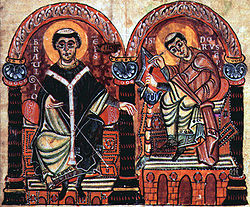Braulio of Zaragoza
Saint Braulio | |
|---|---|
 Braulio and Isidore of Seville. From the Isidori libri originum, 2nd half of 10th century. | |
| Born | 585[1] |
| Died | 651 |
| Venerated in | Eastern Orthodox Church Roman Catholic Church |
| Major shrine | Nuestra Señora del Pilar |
| Feast | 26 March, 18 March (Spain) |
| Patronage | Zaragoza, Aragon |
Braulio (Latin: Braulius Caesaraugustanus), 585 – 651 AD, was bishop of Zaragoza and a learned cleric living in the Kingdom of the Visigoths. Both as pastor and writer, he is one of the most celebrated of saints of the Visigothic Kingdom of Hispania that lasted from the 5th to the 8th century (see History of Spain).
Life
[edit]Braulio was born of a noble Hispano-Roman family. His father, Gregory, was Bishop of Osma. His sister and two brothers were all to hold key posts in the Catholic Church.[2] In 610 Braulio took the habit of a monk, and was later to study at Isidore's school in Seville.
Archbishop Isidore faced a rising threat of Gothic barbarism. His strategic thrust was teaching.[3] Braulio was ordained by Isidore in 624, and joined the clergy serving Seville. The next year, Braulio returned to Zaragoza where his brother John was then bishop, and served as his archdeacon.
Upon his brother's death in 631, Braulio succeeded him as bishop. Known for his personal austerity, almsgiving and preaching, he was an advisor and confidant of several Visigoth kings, including Chindasuinth. The king's son Recceswinth was installed as associate king on Braulio's recommendation.[4]
Braulio worked with Isidore to convert the Visigoths from Arianism.[5] He is said to have encouraged Isidore in his encyclopaedic ambitions,[6] and to have had a hand in the revision of his works. Bishop Braulio, to whom Isidore dedicated it and sent it for correction, divided it into its twenty books.[7] Braulio dubbed it Quaecunque fere sciri debentur, "Practically everything that it is necessary to know".[8]
Braulio was present at the councils of Toledo in 633, 636 and 638. He wrote a life of San Millan.
Braulio responded on behalf of all the Iberian clergy to Pope Honorius I's charge that they might have been neglectful of their duties. One headache was Jews who had been baptised, but who had subsequently lapsed. Whether their handling by the Iberian bishops might have been somewhat lax had been among the Rome's concerns.
Towards the end of his life, he lost his eyesight.[4] He was buried in what is now the church of Nuestra Señora del Pilar in Zaragoza.
Braulio was succeeded as bishop of Zaragoza by Taius (Taio), who had been his pupil. He is buried in La Seo Cathedral, Zaragoza, and is the patron saint of Aragon and of the University of Zaragoza.[1][9]
References
[edit]- ^ a b "Braulio of Saragossa", Oxford Quick Reference
- ^ Farmer, DH. (2011) Oxford Dictionary of Saints. 5th ed. Rev. Oxford University Press, Oxford, UK. ISBN 978-0-19-959660-7.
- ^ Via his eradicating Arianism and his leading National Councils at Toledo and Seville, Isidore helped to unify the kingdom. Though King Sisebut, who came to the throne in 612, was a close friend of Braulio, and became known for Roman-like administration and intellectual cosmopolitanism, there were also forced Christian conversions and anti-Judaic measures.
- ^ a b Weber, Nicholas. "St. Braulio." The Catholic Encyclopedia Vol. 2. New York: Robert Appleton Company, 1907. 23 April 2020
 This article incorporates text from this source, which is in the public domain.
This article incorporates text from this source, which is in the public domain.
- ^ Ghezzi, Bert. "Saint Braulio", Voices of the Saints, Loyola Press, ISBN 978-0-8294-2806-3
- ^ Writers throughout the Middle Ages referred extensively to Etymologiae. Having drawn from many tomes of antiquity, it became so popular that it came to be read in their stead. Some of these stopped being copied, and disappeared.
- ^ Rusche, Philip G. (October 2005). "Isidore's 'Etymologiae' and the Canterbury Aldhelm Scholia". The Journal of English and Germanic Philology. 104 (4): 437–455. JSTOR 27712536
- ^ Braulio, Elogium of Isidore appended to Isidore's De viris illustribus
- ^ "La Universidad de Zaragoza recupera la fiesta de su patrón San Braulio en versión reducida". heraldo.es (in Spanish). 2021-03-26. Retrieved 2022-08-19.
Sources
[edit]- Thompson, E. A. The Goths in Spain. Clarendon Press: Oxford, 1969.
- Iberian Fathers Writings of Braulio of Saragossa, Fructuosus of Braga, translated by Claude W. Barlow. Catholic University of America Press (1969)
External links
[edit]![]() Media related to Braulio of Zaragoza at Wikimedia Commons
Media related to Braulio of Zaragoza at Wikimedia Commons
 This article incorporates text from a publication now in the public domain: Herbermann, Charles, ed. (1913). "St. Braulio". Catholic Encyclopedia. New York: Robert Appleton Company.
This article incorporates text from a publication now in the public domain: Herbermann, Charles, ed. (1913). "St. Braulio". Catholic Encyclopedia. New York: Robert Appleton Company.- (in Latin)1601 Editio princeps of Braulio's Life of Emilian
